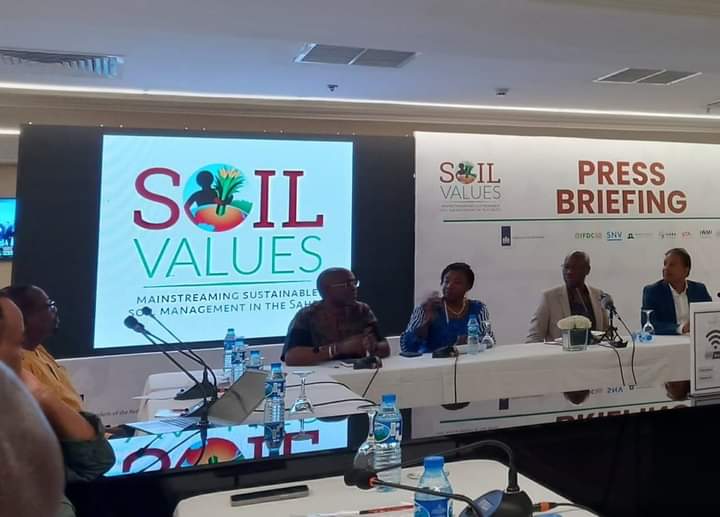International Fertilizer Development Center (IFDC) – an organization that supports Nigeria in its agricultural development, through the implementation of several projects and programs, has introduced a new collaborative project with support from Dutch Directorate General for International Cooperation (D.G.I.S) called SOIL VALUES, in Abuja.
Soil Values, according to Docteur Bidjokazo Fofana, Programme Director of the project, aims to sustainably manage soil fertility constraints and improve ecological food production, while increasing the resilience of small-scale food producers and livestock breeders in the sahel.
“The Soil Values program is implemented by IFDC in collaboration with core partners SNV and Wageningen University and Research (WUR) and various knowledge partners” he said.
While addressing the pressmen, at a Press Conference in Abuja earlier today, IFDC Country Director, shared the positive contributions IFDC in Nigeria in the last five decades.
“Over the past five decades, IFDC has been a pioneer in promoting innovative and sustainable agricultural technologies that have transformed the lives of millions of people around the world. Since its inception in 1974, the organization has never strayed from its core mission: to improve the livelihoods of small-scale farmers and agro-entrepreneurs in order to catalyze positive global change through the transformative potential of agriculture.
“IFDC’s roots lie in the remarkable legacy of the Tennessee Valley Authority (TVA), a forward-thinking initiative born of Franklin D. Roosevelt’s New Deal. The TVA revolutionized agriculture and the economy of the southeastern U.S. by using science to develop cutting-edge agricultural technologies, many of which are still widely used today. These advances have propelled the United States to the rank of the world’s leading agricultural exporter.
“Over the years, IFDC has implemented these technologies on a global scale, helping more than 100 countries boost their agricultural productivity through training and development programs. Our teams, present in more than 25 national offices, work in collaboration with international partners to promote sustainable and resilient agriculture.”
He added that the Feed the Future Enhancing Growth through Regional Agricultural Input Systems (EnGRAIS) for West Africa works with African-led institutions to develop efficient private-sector-led fertilizer markets at regional and national levels, including support for private-sector associations such as the West African Fertilizer Association WAFA.
Toward Sustainable Clusters in Agribusiness through Learning in Entrepreneurship (2SCALE), currently in its second phase, offers a range of support services to private partners, companies and farmer groups, enabling them to produce, process and supply quality food products to local, national and regional markets, including the market base. Pyramid consumers. HortiNigeria facilitates the development of a sustainable and inclusive horticultural sector that contributes to food and nutritional security in Nigeria. Both programs are funded by the Dutch government and implemented by IFDC.
Speaking further on SOIL VALUES PROJECT, the Country Director said:
“For its 50th anniversary, IFDC is committed to redoubling its efforts to meet the current and future challenges of food security and soil health. Guided by a bold vision, IFDC invests in initiatives such as SOILS-Space to Place, which uses space technologies to provide farmers with accurate agronomic information, and the ten-year Soil Values program, which aims to improve sustainable soil management in the most vulnerable regions. “
Funded by the Dutch Directorate General for International Cooperation (D.G.I.S), Soil Values aims to sustainably manage soil fertility constraints and improve ecological food production, while increasing the resilience of small-scale food producers and livestock breeders in the Sahel. Its intervention optimizes landscape and watershed management through participatory planning, effectively integrating soil, water and biodiversity. Efforts are being made to promote incentive-based financial instruments to encourage farmers to adopt sustainable soil management practices.
In addition, activities between stakeholders will be organized to collectively formulate policies conducive to sustainable soil management, thus facilitating the adoption of appropriate practices. The program will explore potential solutions on a global scale by harnessing innovative technologies and approaches to technical and socio-institutional interventions, specifically designed to address the unique challenges faced in Sahelian countries, thus promoting an integrated and participatory approach to effective natural resource management. Soil Values catalyzes investments and interventions that lead to the large-scale adoption of proven technologies and approaches, ensure social inclusion, stimulate debate and build consensus and commitment among all stakeholders.
“Soil Values is implemented by IFDC in collaboration with lead partners SNV and Wageningen University and Research (WUR) and various knowledge partners, such as AGRA, the World Agroforestry Centre (ICRAF), the International Institute of Tropical Agriculture (IITA), ISRIC – World Soil Information and the International Water Management Institute (IWMI), and works through existing national projects, programs, policies and organizations, such as the World Bank’s Food Systems Resilience Program (FSRP).” He said.
